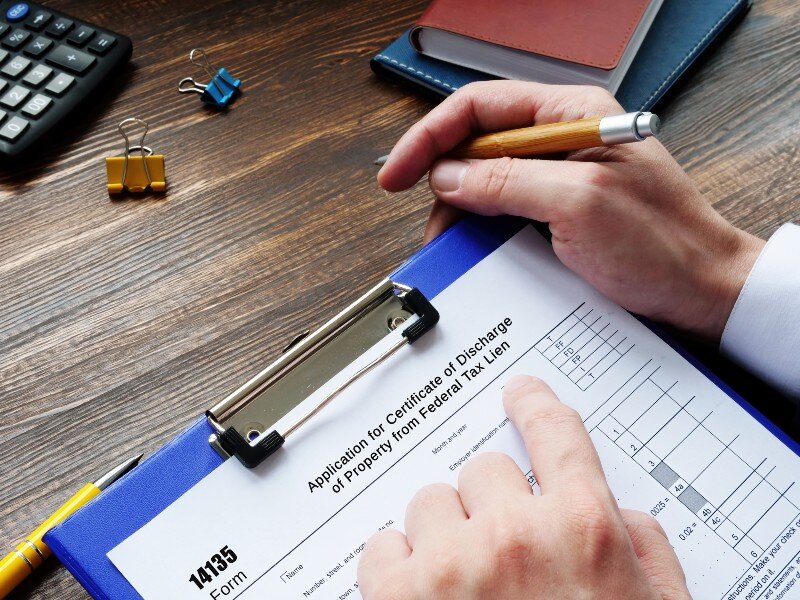
Are you wondering when is the best time to sell a house in Wisconsin? but worried about having a tax lien on it? Having a lien placed on a home adds a further layer of complexity to an already complex process, whether the lien is due to delinquent taxes, alimony, or contractor debts.
Can you sell a house with a lien on it? Even if there is a lien on your home, you may be able to sell it. The first step is understanding the lien’s meaning and how it can affect your sale.
Also, If you’re currently living in Oshkosh and you are wondering how to carry two mortgages while you are fixing up your dream home in Oshkosh, this article will provide you with a few answers.
Can You Sell a House with a Lien or Judgment Lien?
You can sell your home or pay off the lien if you have a tax lien. The seller must clear the title, and you must pay off all liens before the buyer takes possession.
Liens are recorded with the county clerk’s office to safeguard creditors’ interests. The lien serves as public notification that the debtor owes money on the property.
Title searches will reveal any liens filed against a property before selling it. The title company guarantees that all liens are paid in full at closing so that the buyer has a clear title.
Here’s everything you need to know about the process of selling a house.
What is a Lien and What Does It Do?
Creditors in Wisconsin can file different types of liens on an asset to force the asset owner to pay debts or unpaid taxes. A lien shields the lender from the debtor’s inability to make payments.
If the debtor fails to make payments after a lien has been placed on their asset, the lender is entitled to liquidate those assets to satisfy the obligation. As a result of a lien, the defaulter cannot sell the asset. The debt might be recouped by repossession and sale by the creditor.
It can be placed by various creditors, including the government, private individuals, and companies.
Voluntary and Involuntary Property Liens
All liens may be classified into two classes of liens: involuntary and voluntary liens. Involuntary liens are imposed by law, while the parties create voluntary liens to a transaction. These kinds of liens can be used as security for many loans and obligations.
Involuntary Liens
Without the homeowner’s knowledge or permission, creditors could place involuntary liens on the property. A municipal lien is an example of a type of lien placed on a property without the owner’s consent.
If a homeowner fails to pay their property taxes, the local government will pursue legal action to recoup the money. Unpaid real estate taxes can result in a tax lien being filed against the property.
If the tax bill goes unpaid, the federal government will eventually file a Notice of Tax Lien. With this Notice, third parties would be aware of a federal tax lien, and the lien would have precedence or get paid before any property mortgage.
Voluntary Lien
A voluntary lien is created when a homeowner voluntarily commits their property or equity as collateral for a loan. This is because the property owner has expressly consented to the lien, which is, therefore, a valid lien. If the loan is not repaid as agreed upon, the creditor may be able to pursue legal action, such as foreclosure, to recover some or all of the money owed. In finance, a mortgage loan is an example of a voluntary lien.
If this sounds familiar you may want to learn how to stop foreclosure at the last minute in Wisconsin.

What are the Different Types of Liens and What Should I Consider When Selling A House?
There are many types of property liens that may be voluntary or involuntary. We will review each of the property lien types next.
Tax Lien
An involuntary property tax lien is created when you fail to pay your taxes on time or in full. The IRS may then file a notice of federal tax lien in your county records office, which will show up on any title search on the property (and be visible to potential buyers).
In many cases, tax liens will take precedence over even first-lien mortgages. For this reason, most mortgage lenders require borrowers to set aside money each month for property taxes, which the lender then pays on the borrower’s behalf out of an escrow account.
State, local, and federal taxes can be filed as tax liens.
Mortgage Lien
A mortgage is the most typical sort of voluntary property lien. Mortgage liens are often classified into two tiers: primary and secondary.
Primary Lien
The primary lien is the initial mortgage. If the homeowner defaults, the mortgage lender will want to make sure they receive their money first before the second lienholder receives anything.
Secondary Lien
The term “secondary lien” refers to the situation in which a homeowner who has previously obtained a mortgage on the property decides to take out additional financing, either from the same lender who provided the first mortgage or a new lender who sees the homeowner’s equity in the property. If the homeowner defaults, they will send money to the secondary lien holder after the primary is paid off.
Child Support or Alimony Liens
A lien might be put on a property if the owner has not paid alimony or child support due. Although a judge may still approve the sale of a home, it could take quite some time to get through the court system.
Judgment Lien
When a property owner loses a case, and the awarded damages are not paid, the court will issue a judgment against the property owner. The court will register a lien on the property, also known as a judgment lien. Judgment liens prevent the sale of a home without the court’s permission.
Homeowners Association Lien
In the case of late fees, an HOA lien may be assessed affecting the property’s title. In some states like Wisconsin, the HOA can begin the foreclosure process even if the mortgage payments are current.
Mechanic’s Lien
For unpaid building work, contractors can file a mechanic’s lien (sometimes called a construction lien) against a property after 90 days. Like with other liens, mechanic’s liens can make it harder to sell a property. The broad category of mechanical liens includes the following types of liens:
- Liens filed by material suppliers on behalf of construction or remodeling businesses.
- Engineers, architects, and other designers’ liens are filed when they have not been paid for their services.
Key Tips and Tricks to Selling a House With a Tax Lien
If there are any other liens on your property, they must be paid first before transferring ownership of your house. Consider the following methods to avoid further delays in getting your title cleared.
Pay Off the Lien
It may be challenging to come up with the money, but this is the fastest way to clear your title. Pay off any other liens on your property and have them removed from your public records before you sell your home.
Including the amount owed on the lien in the sale of the property is a simple approach to settling the obligation. When a property is sold, the lien is often satisfied. This avoids an earlier need for the seller to pay off the lien out of pocket. You might apply for the money from the proceeds of the sale to the outstanding debts.
Negotiate with the Lienholder
If you can’t pay the debt fully, negotiate with creditors to reduce it. They may be willing to negotiate debt relief if you agree to pay a percentage of the debt.
Arrange a Repayment Plan
If you can’t pay the debt entirely, arrange a repayment plan with the lender. The lender will want to know that they can recover some of their money, so they may be willing to accept lower payments over time than if you were paying off the entire amount all at once. After completing the payment plan, get a lien release in writing so creditors no longer have a legal claim on the property.
Convince the Buyer to Buy the Property with the Lein
You can sell your house to someone who will pay cash. If you have a tax lien on the property, you can use it as leverage to get more money than what was owed in taxes.
While this may be possible in some cases, the lien will still follow the property and must be dealt with if the new buyer ever wishes to get a loan or a clean title.
Statute of Limitations
In Wisconsin, creditors are limited in their ability to seize the assets of debtors. The statute of limitations says a judgment lien in Wisconsin will remain attached to a piece of property for ten years. After that period has expired, the lien can no longer be enforced.
Avoiding a Judgment Lien in Bankruptcy
If you are facing overwhelming debt, one way to get out of it is by filing for bankruptcy. In Chapter 7 bankruptcy, most of your assets will be liquidated and used to pay off creditors. This can include any property that is subject to a lien.
Conclusion
Can you sell a house with a lien on it? Just because a house has a lien or judgment doesn’t mean you can’t sell it. Sometimes, you may need to take care of the lien before the sale goes through.
Remember that if you live in Oshkosh, getting the best deal is possible. Consider how to fix up a house in Oshkosh for profit and fixer-uppers: How to know you are getting a deal in Oshkosh.
